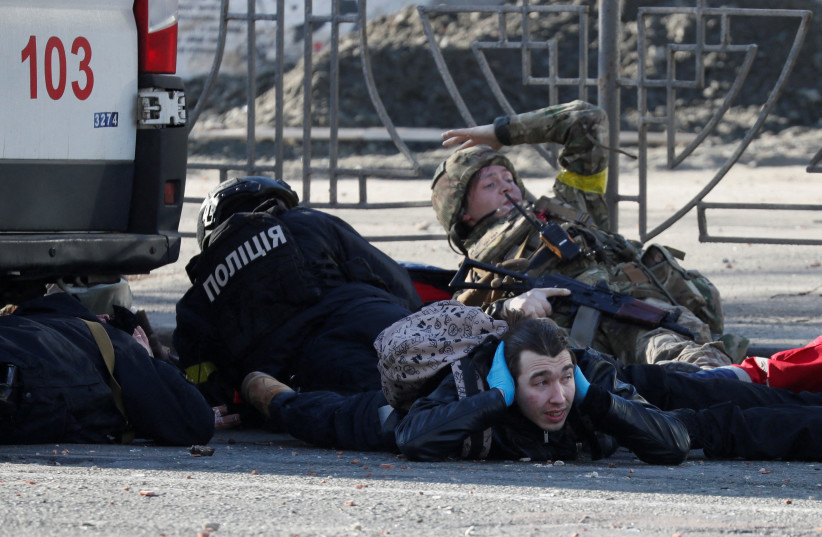On Friday morning one of Kyiv's Jewish communities had three private security guards that they hired in order to protect them in case of attacks by Russian soldiers or Ukrainian criminals - yet hours later they had only one left with a small pistol - since two of the security guards ran away when they heard an explosion.
Ina Markowitz, an Israeli and wife of Kyiv's Chief Rabbi Jonathan Markowitz told The Jerusalem Post Saturday night that “two of the guards ran off and said they had a family to protect. The third guard was so overwhelmed that he collapsed mentally. He cried and literally fell apart. My husband encouraged him and it was very difficult. It was a very difficult Shabbat."
Markowitz and her husband moved to Kyiv from Israel more than 20 years ago as Chabad emissaries with their seven children.
"My husband was an Israeli Air Force officer for twelve years before we came to Ukraine," she said.
Markowitz shares that this one of the most difficult 'Shabatot' she ever experienced: "We stayed with 50 Jews in a bomb shelter and were joined by several families. Jewish Ukrainian neighbors begged to join us since they knew that we have security guards with weapons."

"Kyiv is a ghost town" Markowitz added.
"Between Friday and Saturday the most severe shelling was on Friday before the Sabbath. There were three shellings, and one of them was so loud that it scared our security guards away."
"We spent most of Saturday in the shelter and my husband was the backbone of us all, he was just happy with everyone. We are Israelis, and it actually was to our benefit since it is not pleasant to say, but we are used to such situations. I did not understand this till I realized that there are people who are not used to sirens and bombs - and when I saw their reactions - burting out in tears or pannik attacks, we understood that they need our help.”
Who are the Jews that stayed back in Kyiv?
“Jews who do not have other passports, or those with health problems. Also, older people who are set in their own ways; it took me a while to convince them to join us, let alone leave the city. I was told by an old woman that ‘I will stay in my house so it will not be looted’. I told her ‘you get $ 70 a pension month - what are they going to take?’ People are mentally frustrated. We are in a difficult psychological situation.” Markowitz had to end our phone conversation “there is another siren” she said and hung up.
The Jewish Agency for Israel today announced that it will open six Aliyah (immigration to Israel) processing stations at Ukrainian border crossings with four countries: Poland, Moldova, Romania and Hungary. These stations, operated in conjunction with Nativ and Israel’s Ministry of Foreign Affairs, are meant to immediately assist the expected waves of immigration due to the war in Ukraine. The Jewish Agency is also standing by to immediately increase these stations, as needed.
Since the start of the war, The Jewish Agency had been operating from a central Aliyah station in Lviv. This was the departure point of the first group of olim (immigrants) who crossed into Poland today with the help of Jewish Agency Shlichim (Israeli emissaries).
Following suit with the decision by Israel’s Ministry of Foreign Affairs, The Jewish Agency today also moved its Shlichim from Ukraine to the Polish side of the border. From there, they will cross the border into Ukraine every day, together with Israel’s diplomatic teams, in order to continue assisting Ukrainian Jews who want to immigrate to Israel, in accordance with eligibility for Aliyah granted by Nativ.
Expecting a significant wave of immigration in light of the ongoing war in Ukraine, The Jewish Agency is immediately increasing its presence in the field to care for the olim until they are able to fly to Israel.
The Jewish Agency is also preparing to temporarily house olim in hotels in the countries bordering Ukraine, with support from The Jewish Federations of North America (JFNA), Keren Hayesod and other donors from around the world.
The Jewish Agency works in coordination with the International Fellowship of Christians and Jews, who will assist with flights to Israel, and with the Ministry of Aliyah and Integration, who will assist with Aliyah and provide temporary housing in Israel.
In a complex Jewish Agency operation, and after a nerve-wracking 16-hour process, the first group of olim from Ukraine crossed into Poland today, February 26. The immigrants are being temporarily housed in a hotel near Warsaw where they will remain until they are flown to Israel shortly. Upon arrival in Israel, the olim will receive temporary housing, with help from the Ministry of Aliyah and Integration.
